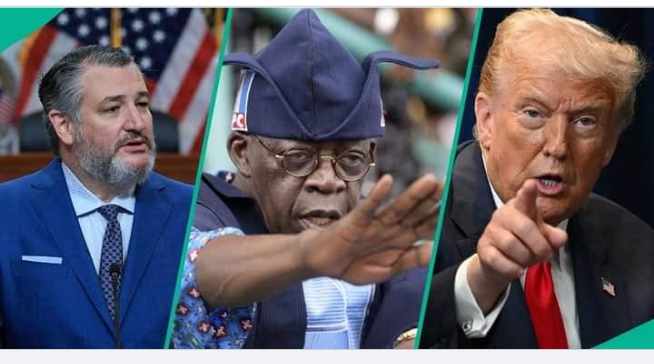Breaking – Ted Cruz Introduces Bill Targeting Nigeria’s Sharia & Blasphemy Laws
Washington, D.C. – September 11 2025
U.S. Senator Ted Cruz (R-Texas) has introduced landmark legislation titled the Nigeria Religious Freedom Accountability Act of 2025 (S. 2747) that targets the enforcement of sharia law and blasphemy statutes in Nigeria.
According to the bill’s text and Cruz’s statement:
It mandates the U.S. Secretary of State to designate Nigeria as a “Country of Particular Concern” (CPC) under the International Religious Freedom Act of 1998, meaning the U.S. considers Nigeria’s violations of religious freedom “systematic, ongoing, and egregious.”
It requires creation of a report listing Nigerian federal and state officials who either:
1. Promote, enact or maintain “blasphemy laws” (defined as laws criminalizing insult or contempt of religion) or sharia-based provisions.
2. Tolerate or facilitate violence by non-state actors (such as “jihadist” groups) who commit religiously-motivated acts.
It authorizes the U.S. President to impose targeted sanctions (asset freezes, travel bans) under Executive Order 13818 on identified individuals in Nigeria who meet the criteria above.
The bill says these measures will apply not only to jihadist groups such as Boko Haram and ISIS‑West Africa, but also to state actors enforcing or failing to prevent blasphemy/sharia law actions.
Senator Cruz said:
> “Nigerian Christians are being targeted and executed for their faith by Islamist terrorist groups, and are being forced to submit to sharia law and blasphemy laws across Nigeria. It is long past time to impose real costs on the Nigerian officials who facilitate these activities.”
Nigerian Response & Regional Reactions
The Nigerian Senate has described the allegations underlying the bill as “false and divisive,” rejecting the bill’s premise of a targeted “Christian genocide.”
The Nigerian House of Representatives passed a resolution condemning the U.S. bill as misleading and harmful to Nigeria’s international image.
Nigerian officials emphasise that insecurity in the country is not primarily religious in nature, but driven by terrorism, banditry, herder-farmer conflicts, and criminality.
Nigeria’s legal system is complex: under its 1999 Constitution each citizen has freedom of religion (Section 38) and freedom of expression (Section 39).
Nonetheless, 12 northern states in Nigeria have adopted Sharia criminal enactments, and federal laws also include blasphemy provisions.
Cases cited by the bill include lynchings or mob attacks on individuals accused of blasphemy, especially in northern states such as Kano and Sokoto.
Some analysts caution that current available public data does not fully support the narrative of a mass-targeted “Christian genocide,” noting that Muslims also suffer heavily from violence in Nigeria’s north.
Why This Matters
The bill marks a significant shift in U.S. foreign-policy tools: it seeks to hold state and local officials in Nigeria personally accountable for human-rights abuses involving religion rather than only non-state actors.
For Nigeria, the CPC designation and sanctions could affect U.S. aid, bilateral cooperation, military relations and its image abroad.
The move may increase pressure on Nigerian states with Sharia criminal codes and intensify domestic debates on religious-freedom, pluralism and the rule of law.
It may also raise tensions between the U.S. and Nigeria, especially given Nigeria’s assertion that the bill mischaracterises its security challenges.
What’s Next
The bill is currently referred to the U.S. Senate Foreign Relations Committee and has yet to be passed by both chambers of Congress.
Nigeria’s government may need to respond diplomatically and engage with U.S. interlocutors to address concerns over blasphemy laws and religious-motivated violence if it seeks to avoid sanction escalation.
Domestic pressure in Nigeria is mounting: some legislators are calling for clarifications or rebuttals of the U.S. assertions and for improved coordination on counter-terrorism.
If you like, I can pull together reactions from Nigerian civil-society groups and detailed breakdowns of the blasphemy laws and how the Sharia criminal codes operate in the 12 northern states.




